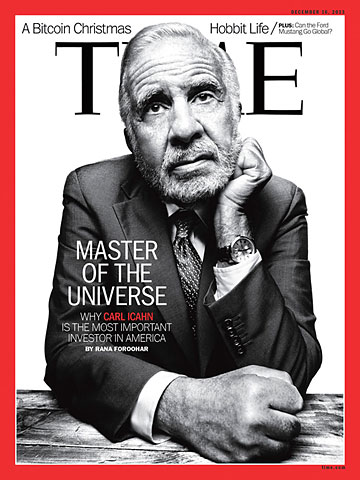
(4 of 8)
Activists like Icahn (and others, including Loeb and Einhorn) believe companies should take that cash and give it to investors in the form of buybacks and higher dividends. Beyond that, there's a sense that many firms in areas like consumer goods and technology are trading at lower-than-desired multiples and could get a higher share price by doing spin-offs or shifting their corporate strategy. While Icahn is no techie--his son Brett brings in most of the technology deals and advises him on holdings like Apple and Netflix--he thinks there are still plenty of corporate business models that will continue to be disrupted by technology, from auto components to the movie industry. "Before the advent of all this stuff with Netflix and streaming, it was tough to put together a group of five smart guys and do a movie for a massive audience without a huge distribution network. Now you can," Icahn says. "There's a great opportunity for someone there."
Right or wrong, it's clear that the activists are gaining sway. Institutional investors like Calpers and Calstrs are pouring more money into hedge funds (which typically have a multimillion-dollar minimum buy-in). The amount of money managed specifically by activist funds has grown to $84 billion in the second quarter of 2013, up from $32 billion in 2008, in large part because pension funds, college endowments and other large institutions are getting behind them.
No wonder: their returns have outperformed the market for the past few years. As of June 30, activist hedge funds made an annualized return of nearly 20% since 2009, compared with 12% for the S&P 500. Icahn's fund, Icahn Partners, is the granddaddy of them all. Before and after closing to outside investors in 2011, it had an annualized return of 27%. Now anyone with $132 can buy a share of IEP, Icahn's public company, and invest with Carl. "The fact that these funds have done so well over the last few years is creating a chicken-and-egg cycle--more institutional money flows in, activists take more actions, and returns go up," says Donna Dabney, executive director of the Conference Board's governance center.
Plenty of buy-and-hold investors, like Warren Buffett, would say that several years of good returns is nothing--and that companies should be managed not for short-term profits but for shareholders who truly stick around for the long haul. Icahn has done that with a few of his investments--like industrial-cleaning company Philip Services, which he has held for more than a decade--but not many.
Others say that while Icahn himself is a success, the rebranding of "barbarians" to "shareholder activists" isn't good for corporate America as a whole. As a recent Citigroup report notes, it's a few big-company deals of the sort that Icahn does--the ones that really drive share prices up--that make activism look so good. "The large improvements are driven by a relative minority of activist efforts that result in outsized stock price gains," explains the report, yet a majority of corporate-activist targets since 2009 have had negative returns within a year of the campaign.
